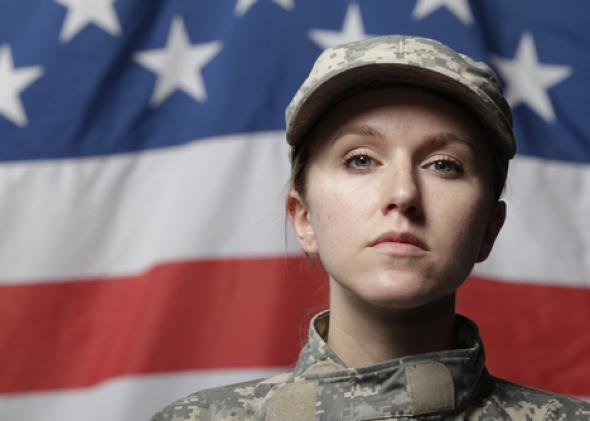This Veterans Day, veterans struggling with the devastating mental health effects of military sexual violence who turn to the Department of Veterans Affairs for help will instead find discrimination. Their claims for disability compensation will turn out differently depending on their gender and where they live. And the VA will expect survivors to submit documentation that often does not exist—like official reports of rape or the results of pregnancy or STD tests—while taking veterans who claim benefits for many other forms of trauma at their word.
The accounts of veterans like Navy veteran Ruth Moore have shown the impact of the VA’s hostility to disability benefit claims related to rape, sexual assault, or sexual harassment. It can be devastating. Moore was raped twice by her Navy supervisor, but the VA repeatedly denied her claims for disability compensation for post-traumatic stress disorder, requiring extra evidence because her claim was linked to military sexual trauma. The VA’s discriminatory demand left Moore without compensation, homeless, and suicidal; it took her more than two decades to finally get the benefits she deserved.
Now, after years of litigation, the VA has released data on military sexual trauma claims that show a pattern. Veterans whose PTSD is caused by military sexual trauma are much more likely to be denied disability compensation than other veterans diagnosed with PTSD.
Our organizations, the Service Women’s Action Network, the American Civil Liberties Union, and the Veterans Legal Services Clinic at Yale Law School, fought in federal court to get this data from the VA under the Freedom of Information Act. Our report “Battle for Benefits: VA Discrimination Against Survivors of Military Sexual Trauma” shows that each year from 2008 to 2012, the VA rate for granting claims base d on sexual trauma-related PTSD lagged behind other PTSD claims by between 16 and 30 percentage points. This disparity is particularly disturbing because sexual assault is more strongly correlated with PTSD in veterans than any other trauma, including combat trauma. The numbers make clear that many military sexual trauma survivors who suffer from debilitating mental health conditions are not getting the disability benefits they need and deserve.
Female veterans suffer most frequently from the VA’s discrimination, because their PTSD claims are more often related to military sexual trauma than are the claims of male veterans. But male veterans suffer a form of sex discrimination too: When they make claims for PTSD caused by military sexual trauma, they have a particularly hard time getting their claims approved. In 2011, for example, the VA granted nearly 49 percent of PTSD claims from female survivors, but only 37 percent of claims from male survivors. This is particularly disheartening since, according to the Pentagon, men made up over half of the military’s sexual assault survivors in 2012.
Finally, and perhaps most alarmingly, in a country that should treat all its veterans equally, our report reveals that veterans’ access to disability compensation depends on where they happen to live. Veterans submit disability claims to one of 58 VA regional offices. The data show huge disparities among the rates at which claims of PTSD based on sexual trauma are granted at different offices. For example, in 2012 the VA granted 57 percent of all of these PSTD claims nationwide. The regional office in St. Paul, Minn., however, granted only 26 percent of these claims, while the Los Angeles office granted nearly 88 percent.
Clearly, the system is flawed. To fix it, the VA must start by changing its regulations so that it no longer holds survivors of military sexual trauma to higher standards than other veterans with PTSD. The VA has repeatedly denied the need for this commonsense change, but the data make clear that it is necessary. Because injustice against veterans is not confined to rulemaking at VA headquarters, the VA must also continue to improve its training efforts surrounding military sexual trauma, targeting claims processors and management in regional offices that have discriminated most egregiously. Finally, the VA must be more transparent about grant rates and should regularly release data on military sexual trauma claims to promote accountability for its treatment of survivors.
Despite years of pressure from veterans’ advocates and survivors themselves, the VA has been unwilling to make these urgently needed changes on its own. It’s time for Congress to step in. Survivors of military sexual trauma have waited long enough.
